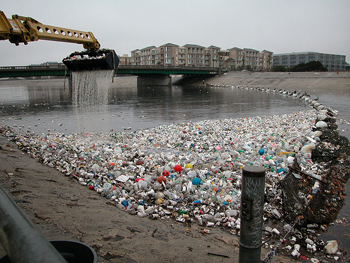Los Angeles becomes largest U.S. city to ban plastic bags
 It’s time to bust out your reusable bags Los Angeles.
It’s time to bust out your reusable bags Los Angeles.In a near-unanimous 13-1 vote by the city council, Los Angeles became the largest city in the United States to put a ban on plastic bags at grocery store checkout lines — though paper bags will still be available for 10-cents each. The ban will affect about 7,500 stores throughout the city.
A reader poll from the Los Angeles Times shows that about 51 percent of readers support the measure and 10 percent support it as long as they have the option to pay for paper bags.
Throughout the country, a handful of cities have already addressed the use of plastic bags through city policy. In 2007, San Francisco banned plastic bags in grocery stores and now bans them at all retail and food establishments. Seattle passed their ban last year. Other cities, like Washington, D.C., have placed a tax on plastic bags and have significantly reduced their use. The small fee of 5-cents per bag reduced plastic bag use by an estimated 60 percent.
Speaking anecdotally as a D.C. resident, the bag tax is working well. Here you are given the choice of bags, you just have to pay for plastic ones. The fee doesn’t prevent you from using them, but you do have to make a conscious decision to do so. Instead of a cashier assuming that you need a bag (as has been my experience in places outside D.C.), or asking “Do you want paper or plastic?” the cashier will ask “Do you need bags?” It’s a small difference in the phrase, but the majority of people I encounter at the grocery store carry reusable bags. The tax in D.C. has created a habit that seems to be catching on.
Whether it’s a ban in L.A. or a tax in D.C., cities are certainly leading the way in reducing plastic bag use.
You can return to the main Market News page, or press the Back button on your browser.

